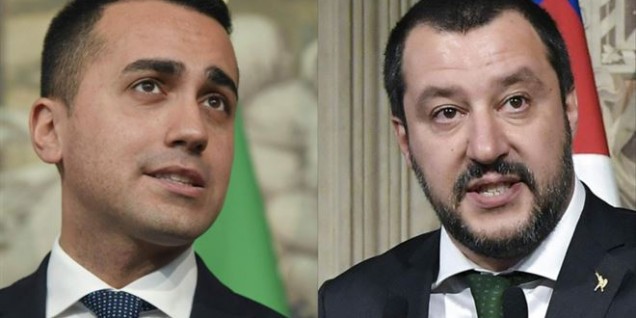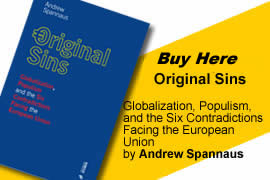The Italian government of Giuseppe Conte, whose EU-critical policies are driven by the leaders of the two coalition partners, and Deputy Prime Ministers, Luigi Di Maio of the Five Star Movement (M5S) and Matteo Salvini of the League, has decided to openly challenge EU budget rules.
When in mid-September Economics Minister Giovanni Tria initially set a deficit target of 1.8% for next year, continuing the reduction requested by the European Commission, Di Maio and Salvini quickly moved to add money for their main objectives. The M5S aims to increase public aid to the poor, by setting what is known as a “universal basic income,” meaning that the government will guarantee the unemployed and pensioners a certain level of income, to “cancel poverty,” in their words. The League, on the other hand, aims to simplify and lower the country’s high tax rates, to help both businesses and individuals. Both of these initiatives will cost significant money, but the two leaders recognized that if after all of their populist rhetoric they ceded ground to the EU’s austerity demands at the first turn, they would be ridiculed and also lose considerable support among their base.
Given that EU rules now make it mandatory to move towards a balanced budget, the result is a showdown which promises to be an inflection point for Europe, either crushing popular aspirations for change, or opening the road towards a repudiation of the free market, pro-finance policies of recent decades.
Paolo Savona, the Minister for European Affairs whom the pro-EU faction has criticized heavily, due to his daring to mention a “Plan B” for leaving the single currency, the Euro, if the EU refuses to change direction, hearkened back to the development policies of Franklin Delano Roosevelt in a speech to the Italian Parliament on Oct. 11. He said, “I very much insist on the need to replicate, a hundred years later, what Roosevelt did with the New Deal and his reforms. […] It is my belief that the experiment we are conducting in this moment is really a large effort of national unity, of coincidence between the interests of the advanced and the backward parts of the country — economically speaking. We all agree that the country needs greater investment. Therefore, let us start to build a New Deal.”
Rather than following the European budget rules, the government’s “Economic and Financial Document,” which sets mid-term public finance and economic strategies, now allows for a deficit of 2.4% over the next 3 years. This is not much of a change compared to the current situation; indeed it is practically the same as the figure for 2018 (2.3%). Yet this simple decision, to stop the contraction by moderately increasing social spending and trying to inject some more money into a slow-moving economy, could force a fundamental change in Europe.
EU officials have railed against the Italian government’s gall in daring to abandon the mindset of austerity. European Commission President Jean-Claude Juncker stated publicly that deviating from the rules would be catastrophic: “If Italy wants further special treatment, that would mean the end of the euro. So you have to be very strict.” EU Budget Commissioner Pierre Moscovici, despite claiming he prefers to avoid a crisis with Italy, warned that the country must “follow the rules,” or the end result could be sanctions, which could actually aggravate the country’s fiscal situation, due to the imposition of a fine of .2% of GDP.
The logic behind the EU orthodoxy, which is supported by many in the Italian establishment as well, is that the country’s large public debt doesn’t allow for any room for maneuver. Moscovici put it this way on Oct. 2: “The Italian people must not be mistaken – every euro more of debt is a euro less for highways, for schools, for social justice.”
The same idea had been expressed by Italian State President Sergio Mattarella a few days earlier: “Having solid public finances is an indispensable condition for social security, especially for youth and for their future.”
It sounds reasonable at first, until you realize that they are suggesting that it’s necessary to limit social spending today, so that in theory more can be spent later. Indeed, the Fiscal Stability Treaty, an EU agreement approved in 2012, mandates a “debt brake” for highly-indebted countries, that in Italy’s case would mean cutting the state budget by approximately 60 billion euros – or 3% of GDP – per year, for 20 years. Such a level of austerity could be have a devastating effect on areas such as health care and investment in basic infrastructure, sectors that have already suffered considerably in recent years. The cuts required by EU rules would ultimately allow for spending more money on social programs… 20 years from now.
While the Italian government’s plans entail some risks, and there is no doubt that public spending is often inefficient in Italy, the notion that stimulus through giving more money to the poor and reducing taxes on workers would hurt the economy, is not borne out by the facts. Indeed, the opposite has been shown to be true in Europe over the past decade: cutting social spending and raising taxes across the board generally leads to a contraction in GDP, sometimes dramatically. That is why in recent years practically all of Italy’s political leaders, along with many EU officials as well, have publicly stated that it’s important to concentrate more on growth and less on austerity. Yet the first time that a government has actually tried to go in that direction, the reactions have been fierce.
Apart from threats from the EU bureaucrats, the immediate problem comes from the financial markets. Interest rates on government debt have increased rapidly. For Italian banks this entails a decrease in the value of their assets – bond yields and prices move in opposite directions – which raises the risk of needing additional capital to cover their risks. There is also a negative effect on public finances, as it costs the country more to roll over expiring debt.
The question is, why are financial markets worried? The reality is that despite its large public debt, and internal imbalances between North and South, Italy is nowhere near default, and still has a strong industrial economy, one of the largest in the world. Italians also have one of the highest savings rates in the world.
The real worry among market operators seems to be that a disavowal of EU authority could ultimately lead to the end of the European single currency. Indeed the prices of credit default swaps (CDS), financial derivatives that provide insurance on bonds, show that the greatest fear is that Italian debt could be redenominated in the country’s old currency, the Lira, meaning that Italy would abandon the Euro.
Although representatives of the current government deny any intention of leaving the EU, considering the Brexit vote, President Donald Trump’s adversion to multinational institutions, and the growth of political parties across Europe that criticize the centralization of power by the European Union, there is a clear sense that this budget fight goes well beyond the issue of a modest increase in the deficit, raising the possibility of returning greater power to national governments, that would challenge the globalization policies of recent years.
The League and M5S seem to have no intention of taking a step back from their plans for increased government spending. Their view is that the orthodoxy has failed, and now it’s time for more public investment to kick-start the economy and tackle the problems caused by austerity and globalization.
The final budget law must be approved by the end of this year. By then, either Brussels will somehow succeed in cowing the Italians, possibly exploiting market pressure to force a change in direction, or even a change in government, as happened in 2011; or the taboo will be broken, and the constant pressure to follow the budget rules will suddenly disappear, rapidly raising questions about the future structure of the European Union.
Subscribe to access all news items







Trackbacks/Pingbacks
[…] This article is reprinted from Transatlantico. […]